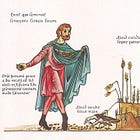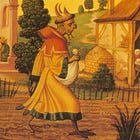What if your faith is shallow, and you won’t know until it’s too late?
The Parable of the Sower teaches us that while hardships can strengthen some, they destroy those whose faith is based on stony ground or suffocated by thorns.

The Parable of the Sower teaches us that while hardships can strengthen some, they destroy those whose faith is based on stony ground or suffocated by thorns.
Editor’s Notes
Our Lord told the Parable of the Sower, read on Sexagesima Sunday, early in His public ministry, as He began to teach in parables more frequently. It is the first recorded parable in the Gospels.
It follows growing opposition from the Pharisees and the rejection of His teachings by many, prompting His shift to parabolic instruction.
Shortly after, He explained the meaning of this and other parables to His disciples, emphasising the mysteries of the Kingdom of God. He also explained that he was using this manner of teaching both to reveal truths to those who are disposed to receive them and to conceal them from the hardened-hearted.
In this piece, Fr. Coleridge tells us…
How the seed on stony ground warns of souls who welcome the truth but crumble under trial.
That difficulties, persecution and suffering expose whether faith is deeply rooted or doomed to wither.
Why the battle between grace and the world claims so many souls who once believed.
He shows us that only those who endure the fire of difficulties and tribulation will bear lasting fruit.
The Parable of the Sower
The Training of the Apostles, Vol. III
Chapter VIII
St. Matt. xiii. 18–23; St. Mark iv. 10–25; St. Luke viii. 9–18;
Story of the Gospels, § 61
Burns and Oates, London, 1884
Headings and some line breaks added.
Sung on Sexagesima Sunday
Part I: How does the Parable of the Sower unlock all Christ's other parables?
Part II: How do the birds reveal a brutal war for the soul in the Parable of the Sower?
Part III: What if your faith is shallow, and you won’t know until it’s too late?
Part IV: What makes for good soil in Christ’s Parable of the Sower?
Falling on stony ground
The second instance of failure in the seed, of which our Lord goes on to speak, is in some respects not quite so fatal, and in other respects it is more lamentable. In the case of which we are now to speak, the good seed of the Word is taken in with a certain amount of readiness and avidity, but the shallowness of the soil prevents its striking its roots deep into the earth.
‘And these likewise are they that are sown on the stony ground, who when they hear the Word immediately receive it with joy, and they have no root in themselves, but are only for a time, and when tribulation and persecution ariseth because of the Word, they are presently scandalised, they believe for a while, and in time of temptation they fall away.’
It must frequently happen in countries like those in which these parables were spoken, that the scorching sun of the summer soon withers up the shoots which have sprung up in ground which has not moisture or depth sufficient for the strong nourishment which is required under such conditions of atmosphere.
Our Lord uses this circumstance as an illustration of another form of danger to the good seed of the Word of God.
Attractiveness of the Gospel
That Word is so congenial to the needs of human souls, it is so full of the sweetness and wisdom of God, and of the beauty which naturally belongs to all His works, it comes to men when they are so exhausted with futile efforts to find out the truth for themselves, and to provide in some sort of way for the craving after what is true and beautiful and holy which belongs to them as His intelligent creatures, it breathes peace and hope and security, and answers so perfectly the questions by which men are ordinarily tormented, that it is not wonderful that it should be welcomed at first by many souls which yet have not the strength to undergo trial for its sake.
At the time when this parable was spoken, our Lord must have had before His mind many cases to which the description of the seed sown on the stony ground would apply.
The Gospel teaching had been presented to the populations of Galilee with a charm and attractiveness quite unexampled. He had been Himself the Preacher, and He had recommended the beautiful doctrines which He delivered by His own ineffable graciousness of manner, as well as by hundreds of miracles of mercy.
He had been received with enthusiasm, and at first there was no opposition to His teaching and no hostility to His Person. It was but natural that men should flock to such a Teacher, and that the Divine doctrine which He scattered around Him, as the sower scatters his seeds, should have been eagerly caught at by thousands.
But even as He was speaking, the scorching sun of adversity was in the air above Him, and we have already heard of the plots against His life, and of the extreme malignity of the calumnies against Him.
It was not to be a transient storm. Things were to go on as they had begun, and the persecution was soon to pass on from Himself to those who believed in Him, till at last He was to die by the hands of His enemies on the Cross, and the mere fact of being His adherent was to be enough to mark any one out for the most cruel treatment at the hands of His own nation.
It was soon to be a matter of experience that the seed which was to spring up from the sowing of the Gospel teaching would need deep roots and a soil in which it could fasten itself securely, for that it would be tried most severely by adversity and persecution.
Persecution
The persecution which awaited the faithful disciples of our Lord in that country and nation was but a type and figure, so to say, of the difficulties which would always beset the following of Jesus Christ.
For many centuries the world continued outwardly hostile to the Church, but even after that state of things ceased, and after the foundation of the Christian system of society, it was to be the same. That is, the practice of the precepts of our Lord, and much more of His counsels, could not be carried out without strong and well-grounded virtue, without the gifts of the Holy Ghost in the intelligence and in the heart, without charity and the love of God mastering the soul.
The number, so to say, of skin-deep Christians may be greater or less under particular states of external conditions in the Church, according to the relation in which she finds herself to the powers of the world, as it is easier to be a Catholic in England now than in the reign of James I., or to be a Christian in Japan now than in the reign of Taicosama.
But the external conditions of the Christian communities make little difference in the opposition between the spirit and the body, in the battle between sense and conscience, in the attractiveness and seductiveness of the world, in the charms of wealth and of earthly success, and in the poison of the cup of pleasure.
The Christian must take up his cross, whether he lives in the days of persecution or in the days of peace, and as long as this remains true so long will it be true that many a seed is cast on stony ground, which will be infallibly withered by the scorching rays of the sun.
The seed among the thorns
But when the seed has escaped the danger which is signified in the parable by the stony ground on which it has yet fallen, there yet remain other perils before it can be as fruitful as the intention and the care of the sower require.
‘Others there are who are sown among thorns; these are they that hear the word, and the cares of the world, and the deceitfulness of riches, and the lusts after other things, entering in, choke the Word, and it becometh fruitless.’
They are choked with the cares and riches and pleasures of this life, and yield no fruit.
It appears that the thorns which are here spoken of are more probably brambles and briars, such as are used for hedges, as marks for the limits of property, and for the defence of the soil devoted to the good grain, and though perhaps cut down each year, they would spring up again at the ordinary time, and being of strong and rank growth, would soon outstrip the good grain and overtop it. Then such plants have a way of interlacing their shoots, so that at length they would form a sort of cage, under which the good seed would be stifled.
This is the image which our Lord here uses for the description of that very large class of Christians who render to the good Sower so little return for the seed He has sown at so much cost, because their hearts are filled with the cares and pleasures and ambitions and aims of this world.
The description is in itself so graphic and so true as scarcely to require any further commentary, although one of the Fathers has said that we should never have hit on the interpretation of the thorns which compares them to riches and pleasures, because these things have not in themselves anything that pricks like a thorn.
Yet true experience shows how all these things are full of anxiety, when the mind dwells on them as objects of desire, and spends itself in schemes and contrivances for acquiring them. Our minds are too small to be occupied with many things at once, and therefore the mere devotion of our attention to these worldly matters is enough to hinder us from giving ourselves to the things of God, and this is the case even when men of high virtue find themselves in posts of importance, and, obliged by the duties of their state of life, to give the greater part of their time to such duties.
And again, there is nothing soothing or satisfying even in the possession of these things, a possession which is always beset by uncertainty, always liable to a thousand dangers, and is a constant fret to the soul which has to attend to it.
Meaning of the image
But it is much more commonly the case that the cares of the world lead the soul actually away from God, because they tend to fix the affections and the desires of the heart upon these false goods, they tend to lead to unlawful aims and unlawful means of gaining those aims, to injustice, to fraud, to violence, to falsehood, and when these earthly goods have been acquired, they tend to fill the mind with pride and licentiousness, and so to the blinding and degradation of the soul by lusts of all kinds.
Our Lord sketches the evil with a light hand, and spares the full details of the consequences of worldliness on the spiritual character. By doing this He sets before us the great truth, namely, that it is sufficient for the heart and mind to be occupied with worldly things, in order to hinder the growth and fertility of the good seed.
Even if these things could be made the chief objects of life without leading to positive violations of the law of God, the simple occupation of the mind with them would act as the network of briars acts on the shoots of wheat that are enclosed and stunted beneath it.
Our Lord has before Him the whole fruitful range of the Christian virtues, the manifold fertility of the gifts of grace and of the Holy Ghost in the human soul, that immense richness of yield of which our nature is capable under the influences of grace, and He warns us that this fertility cannot be under the circumstances of which He is speaking.
‘The Word becometh fruitless, they yield no fruit’—terrible words indeed for the Christian to hear concerning himself, when he has the faith which tells him of the endless glories and riches of the eternal kingdom, all of which are to be acquired here and now, and can never be acquired at all unless the precious seed of which our Lord is the Sower takes deep root and fructifies in the heart.
But what about the seed that falls on good soil?
In the next piece, Fr. Coleridge will tell us…
How the good soil represents those who hear, receive, and persevere in the Word of God.
That grace bears fruit in different degrees, depending on the soul’s response and cooperation.
Why the trials of life are not obstacles but the means by which faith is perfected.
… and he will show us that holiness is not uniform, but varies according to God’s providence and our generosity.
Hit SUBSCRIBE now to make sure you don’t miss any future parts:
The Parable of the Sower
Part I: How does the Parable of the Sower unlock all Christ's other parables?
Part II: How do the birds reveal a brutal war for the soul in the Parable of the Sower?
Part III: What if your faith is shallow, and you won’t know until it’s too late?
Part IV: What makes for good soil in Christ’s Parable of the Sower?
Here’s why you should subscribe to The Father Coleridge Reader and share with others:
Fr Coleridge provides solid explanations of the entirety of the Gospel
His work is full of doctrine and piety, and is highly credible
He gives a clear trajectory of the life of Christ, its drama and all its stages—increasing our appreciation and admiration for the God-Man.
If more Catholics knew about works like Coleridge’s, then other works based on sentimentality and dubious private revelations would be much less attractive.
But sourcing and curating the texts, cleaning up scans, and editing them for online reading is a labour of love, and takes a lot of time.
Will you lend us a hand and hit subscribe?
Read next:
Follow our projects on Twitter, YouTube and Telegram:








